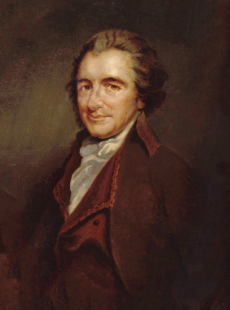
In the course of his life, Thomas Paine (1737-1809) became one of the most influential mover and shakers of the eighteenth Century, becoming a ferocious writer and critic of his time and one of the finest public speakers in history. Yet his first line of work was in making lady’s corsets, since it was his father’s trade and he had not received a very high level of education. In fact, until the age of thirty-seven Thomas Paine had done nothing of historical note in his life.
But in 1774 he sailed across the Atlantic to Philadelphia in America in search for a new life, just two years before the outbreak of the American War of Independence. He quickly became acquainted with Philadelphia’s high society, impressing them with his conversational skill and captivating use of language, debating with the intellectuals of the city in the evenings for hours.
Meeting the owner of Pennsylvania Magazine in a book store one day, Paine was made editor of the publication. With this newfound position, he started to publish letters in the magazine under various pseudonyms, in which he expressed his radical views.
In the late-eighteenth century, the transatlantic slave-trade was in full swing, with hundreds of thousands of slaves being put to work in the Americas in the most terrible conditions. Paine was appalled by the slavery in North America and writing in one letter, which argued for the freeing of slaves, he asked, “Is the barbarous enslaving of inoffensive neighbours and treating them like wild beasts, subdued by force, reconcilable with divine precepts?” Coincidentally, only weeks after the article was published, a group of Philadelphians decided to form the Pennsylvania Society for the Relief of Negroes Unlawfully Held in Bondage – the first abolitionist society in North America.
But what really put Paine on the map was the anonymous publication of his pamphlet Common Sense in 1776, which helped shape the course of the war which broke out in the same year between Britain and the Thirteen Colonies of North America into a war for America’s independence. In the essay he attempted to intellectually destroy the notion of hereditary monarchy – the political system which the Thirteen Colonies, as colonies of King George III of Britain, was governed by. He argued that King George III had no natural right to rule and called for America to separate from Britain so as to recreate itself as a democratic nation with its own laws and values, declaring with revolutionary vigour, “We have it in our power to begin the world over again.”
It became a sensation. Washington, who later became the United States’ first president, made sure the essay was read to all his soldiers and was read aloud far and wide in the Thirteen Colonies. Measured against the proportion of the population at the time, Common Sense is America’s best-selling publication of all time.
However, after the war had been fought and won by the Thirteen Colonies and a new nation had been born, Paine’s critical eye remained unwavering, criticising the corruption he started to observe among the leaders of the revolution. As a result, he was kicked out of the elite circle, in spite of all he had done for them.
He went on to become a strong supporter of the French Revolution which began in 1789, writing a defence of the political uprising in a book called Rights of Man. Yet, when the French monarchy was put on trial, Paine argued against their execution because, astoundingly for his time, he did not approve of the death penalty. The death penalty was not to be completely abolished in Britain, for instance, until 1998 – though it had not been used for decades prior to then. For his moral and political prescience he was placed in prison by the French government and only escaped execution himself by a hair’s breadth.
When he died in 1809 at the age of 72, only six people came to his funeral. Shunned by his revolutionary comrades in America and France, he died in a world in which it seemed his radical work had been forgotten. But, in the writing of history, his quest for the emancipation of common men and women has become legendary and is considered by many to be one of the most influential Britons who ever lived, due to the power of his pen.
Sources:
- http://www.bbc.co.uk/programmes/b04d88r3
- Common Sense, by Thomas Paine
Image: https://commons.wikimedia.org/wiki/File:Thomas_Paine_rev1.jpg

0 Comment:
Be the first one to comment on this article.